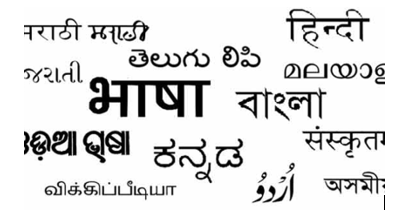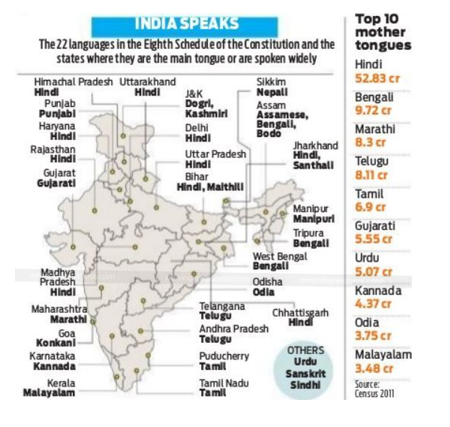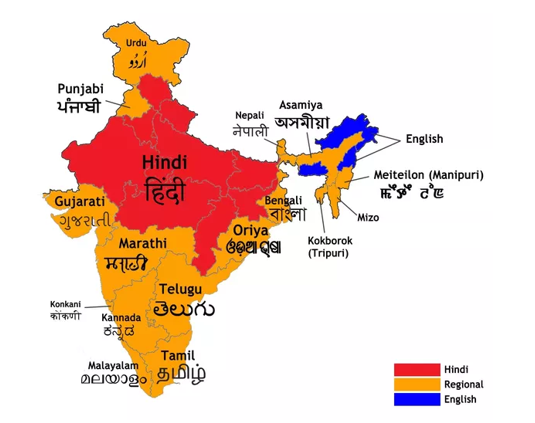Part XVII of the Indian Constitution (Articles 343 to 351)
Part XVII of the Indian Constitution, encompassing Articles 343 to 351, which delineate the provisions related to the official language of the Union, the states, the judiciary, and inter-governmental communication.

Part XVII: Official Language (Articles 343–351)
Chapter I: Language of the Union (Articles 343–344)
- Article 343: Hindi in Devanagari script is designated as the official language of the Union. However, English was permitted for official purposes for 15 years from the commencement of the Constitution (i.e., until 1965). Parliament retains the authority to legislate the continued use of English beyond this period.
- Article 344: Mandates the President to constitute a Commission after five years from the Constitution’s commencement, and thereafter every ten years, to recommend measures for the progressive use of Hindi and restrictions on English usage. A Parliamentary Committee examines these recommendations.
Chapter II: Regional Languages (Articles 345–347)
- Article 345: Empowers state legislatures to adopt any language in use within the state or Hindi for official purposes. Until such legislation is enacted, English continues to be used for official purposes.
- Article 346: Specifies that the language authorized for Union official purposes shall be used for communication between states and between a state and the Union. However, if two or more states agree, Hindi can be used for inter-state communication.
- Article 347: Allows the President to recognize a language spoken by a substantial portion of a state’s population as an official language for that state or any part thereof, upon demand.
Chapter III: Language of the Supreme Court, High Courts, etc. (Articles 348–349)
- Article 348: Stipulates that English shall be used for all proceedings in the Supreme Court and High Courts, as well as for authoritative texts of laws and bills, unless Parliament provides otherwise. Governors may authorize the use of Hindi or other state languages in High Court proceedings with the President’s consent.
- Article 349: Restricts Parliament from enacting laws altering the language used in legislative and judicial matters without the President’s prior sanction, ensuring careful consideration of linguistic changes.
Chapter IV: Special Directives (Articles 350–351)
- Article 350: Ensures that individuals can submit grievances to any authority in any of the Union or state languages.
- Article 350A: Obligates states to provide primary education in the mother tongue for children belonging to linguistic minority groups.
- Article 350B: Provides for the appointment of a Special Officer for Linguistic Minorities by the President to investigate and report on safeguards for linguistic minorities.
- Article 351: Directs the Union to promote the spread of Hindi, develop it to serve as a medium for India’s composite culture, and enrich it by assimilating forms and expressions from Hindustani and other Indian languages listed in the Eighth Schedule.
Interesting Facts
- No National Language: The Constitution does not declare any language as the national language of India. While Hindi is the official language of the Union, India recognizes multiple official languages.
- Eighth Schedule: Lists 22 languages recognized by the Constitution, including Hindi, Bengali, Telugu, Marathi, Tamil, Urdu, and others.
- Official Languages Act, 1963: Enacted to continue the use of English for official purposes even after 1965, following protests against the imposition of Hindi, especially in non-Hindi-speaking states.
- Linguistic Diversity: India is home to over 1,600 languages, with 22 officially recognized in the Eighth Schedule, reflecting the country’s rich linguistic tapestry.


Notable Judicial Interpretations
Murasoli Maran v. Union of India (1971)
- Context: This case addressed the constitutional validity of the Official Languages Act, 1963, which allowed the continued use of English for official purposes beyond the initial 15-year period stipulated in Article 343.
- Judgment: The Supreme Court upheld the Act, emphasizing that Parliament has the authority under Article 343(3) to legislate the continued use of English. This decision underscored the flexibility provided to Parliament in determining the Union’s official language policy.
M.N. Ravichandran v. Union of India
- Context: The petitioner challenged the definition and promotion of Hindi under Article 351, arguing that it did not align with the constitutional directive to develop Hindi as a medium for India’s composite culture.
- Judgment: The court dismissed the petition, stating that the measures taken to promote Hindi were within the constitutional framework and did not infringe upon the rights of non-Hindi speakers.
Champatlal v. State of Andhra Pradesh (1996)
- Context: This case examined the use of numerals in official documents, questioning whether the state could mandate the use of Devanagari numerals.
- Judgment: The Andhra Pradesh High Court held that, as per Article 343, the international form of Indian numerals should be used for official purposes, and any deviation required appropriate legislative backing.
Santan Singh v. Central Public Information Officer (2016)
- Context: The petitioner sought information under the Right to Information Act in Hindi, which was denied by the public authority.
- Judgment: The Central Information Commission ruled in favor of the petitioner, emphasizing that under Article 350, individuals have the right to submit representations in any of the languages used in the Union or the state.
Jhinkan v. State of Uttar Pradesh (2015)
- Context: The petitioner challenged the requirement to take competitive examinations in Hindi, arguing it disadvantaged non-Hindi speakers.
- Judgment: The Allahabad High Court upheld the use of Hindi in examinations, stating that Article 343 designates Hindi in Devanagari script as the official language of the Union, and its use in state examinations was constitutionally valid.
Intriguing Facts about Part XVII
No National Language Declared: The Indian Constitution does not designate any language as the “national language.” While Hindi is the official language of the Union, English continues to be used for official purposes.
Eighth Schedule Languages: The Constitution’s Eighth Schedule initially listed 14 languages, which has since expanded to 22, reflecting India’s linguistic diversity.
Anti-Hindi Agitations: In the 1960s, particularly in Tamil Nadu, there were significant protests against the imposition of Hindi, leading to the enactment of the Official Languages Act, 1963, which allowed the continued use of English indefinitely.
Special Officer for Linguistic Minorities: Article 350B provides for the appointment of a Special Officer to investigate matters relating to the safeguards of linguistic minorities, ensuring their rights are protected.
Promotion of Hindi: Article 351 directs the Union to promote the spread of Hindi, develop it to serve as a medium for India’s composite culture, and enrich it by assimilating elements from other Indian languages.
Legislative Measures Influencing Part XVII
Official Languages Act, 1963
- Purpose: To provide for the languages to be used for the Union’s official purposes, parliamentary business, and certain judicial proceedings.
- Key Provisions:
- Allowed the continued use of English alongside Hindi for official purposes beyond the initial 15-year period stipulated in Article 343.
- Mandated the use of both Hindi and English for central and state legislation and for communication between the Union and states.
|
Official Languages (Amendment) Act, 1967
- Context: In response to widespread protests, particularly from non-Hindi-speaking regions, against the imposition of Hindi as the sole official language.
- Key Provisions:
- Ensured the indefinite use of English for official purposes unless a resolution to discontinue it is passed by the legislature of every non-Hindi-speaking state and both Houses of Parliament.
- This amendment effectively established a bilingual policy at the Union level.
What is the Language of the Union?
- According to the Indian Constitution, the Hindi language written in the Devanagari script is to be the official language of the Union. But, the form of numerals to be used for the official purposes of the Union has to be the international form and not the Devanagari form of numerals.
- The Constitution Assembly stated that for a period of 15 years from the inception of the Constitution (1950 to 1965), the English language would continue to be used for all the official purposes of the Union.
- Even after 15 years, the Parliament may provide for the continued use of the English language for specific purposes.
- In 1955, the President of India appointed an Official Language Commission under the chairmanship of B.G. Kher.
- In 1956, the commission submitted its report to the President.
- The Commission’s report was examined by a Parliamentary committee under the chairmanship of Gobind Ballabh Pant.
- The Parliament enacted the Official Languages Act in 1963.
- The act provides for the continued use of English (even after 1965), in addition to Hindi, for all official purposes of the Union and also for the transaction of business in Parliament.
- This act enables the use of English indefinitely (without any time limit).
- This act was amended in 1967 to make the use of English, in addition to Hindi, compulsory in certain cases.
Do we have any official Regional Languages?
- The Indian Constitution does not specify the official language of different states.
- The Constitution makes the following provisions:
- The State legislature may adopt any one or more of the languages in use in the state or Hindi as the official language of that state. Until that is done, English is to continue as the official language of that state.
- Most of the states have adopted the major regional language as their official language.
- Andhra Pradesh has adopted Telugu.
- Kerala adopted Malayalam.
- Assam adopted Assamese.
- West Bengal adopted Bengali.
- Odisha adopted Odia.
- 9 Northern states; Himachal Pradesh, Uttar Pradesh, Uttrakhand, Madhya Pradesh, Chhattisgarh, Bihar, Jharkhand, Haryana and Rajasthan have adopted Hindi.
- Gujarat has adopted Hindi in addition to Gujarati.
- Goa has adopted Marathi in addition to Konkani.
- Jammu and Kashmir have adopted Urdu.
- Certain northeastern States like Meghalaya, Arunachal Pradesh and Nagaland have adopted English.
- The choice of the state to adopt a state official language is not limited to the languages listed in the 8th Schedule of the Indian Constitution.
- The Official Languages Act (1963) states that English should be used for purposes of communication between the Union and the non-Hindi states.
- When the President (on a demand being made) is satisfied that a significant proportion of the population of a state prefers the use of any language spoken by them to be recognised by that state, then he may direct that such language shall also be officially recognised in that state.
- This provision aims at protecting the linguistic interests of minorities in the states.
What is the Language of the Judiciary and Legislation?
- The Indian constitution Stated that Until the Parliament provides otherwise, the following should be in the English language only:
- All proceedings in the Supreme Court and every high court.
- The authoritative texts of all bills, acts, ordinances, orders, rules, regulations and bye-laws at the Central and state levels.
- The Parliament has not made any provision for the use of Hindi in the Supreme Court. Therefore, the Supreme Court hears only those who petition or appeal in English.
- The governor of a state, with the previous consent of the president, can authorise the use of Hindi or any other official language of the state, in the proceedings in the high court of the state, but not with respect to the judgements and orders passed by it.
- A state legislature can specify the use of any language (other than English) with respect to bills, acts, ordinances, orders, rules, regulations or bye-laws, but a translation of the same in the English language is to be published.
Development of the Hindi Language
- Under Article 351, The Indian Constitution imposes a duty upon the Centre to promote the spread and development of the Hindi language.
- The 8th Schedule of the Constitution specifies 22 languages (originally 14 languages). These are Assamese, Bengali, Bodo, Dogri (Dongri), Gujarati, Hindi, Kannada, Kashmiri, Konkani, Mathili (Maithili), Malayalam, Manipuri, Marathi, Nepali, Odia, Punjabi, Sanskrit, Santhali, Sindhi, Tamil, Telugu and Urdu.
- Sindhi was added by the 21st Amendment Act.
- Konkani, Manipuri and Nepali were added by the 71st Amendment Act.
- Bodo, Dongri, Maithili and Santhali were added by the 92nd Amendment Act.
